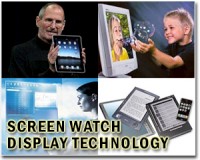 |
San Francisco (AFP) Feb 11, 2011 Nokia has scrapped its smartphone software for Microsoft's supercharged mobile operating system. Now a world enamored by Apple's iPhone and Android handsets needs reason to care. Microsoft is hoping that its alliance with the world's largest mobile phone maker will catapult Windows Phone 7 (WP7) from the rear of a smartphone market that Nokia tenuously rules with Symbian software. A key to success for Microsoft will be winning over developers whose applications are vital to the popularity of smartphones. Nokia should make it an irresistible proposition for developers since the Finnish firm commands more than 30 percent of the mobile phone market, giving "app" makers a vast audience of potential customers for digital wares. "In simplest terms, this alliance can dramatically increase the customer base for Windows Phones, and, by extension, your apps and games," Microsoft's Matt Bencke said in a post at the Windows Phone developers blog. "We're working to make it as easy as possible for developers to take advantage of this new opportunity." Microsoft's Windows Phone Marketplace for fun, hip, or functional apps will complement a Nokia shop that delivers four million downloads daily, according to Bencke. Nokia's distribution network trumps those for Apple or Google-backed Android devices, while Windows Phone 7 is an impressive platform with terrific tools for developers, according to influential technology blogger Robert Scoble. "I don't know whether this partnership will work, but having Nokia as (an ally) will presumably give Windows Phone 7 the kind of scale that is attractive to developers," said Engadget and gdgt blog founder Peter Rojas. "We all know a vibrant app library is a necessary component of any mobile ecosystem." Nokia could also help the US software titan embrace the notion that people don't usually have operating systems foremost in mind when picking smartphones, according to Directions On Microsoft analyst Michael Cherry. "Nokia may be better at marketing in this environment and making sure the phones themselves are actually things people get excited about," Cherry said. "I've never seen anyone come into an Apple Store and say they'd like to buy a phone that runs iOS," he said. "I think Nokia understands that better than Microsoft does." Working closely with Nokia promises to let Microsoft influence how well new smartphones capitalize on WP7 capabilities, according to the analyst. Microsoft is under pressure to remain relevant as modern lifestyles shift from using desktop or laptop computers to relying on smartphones or tablets. "The original goal for Microsoft was a personal computer in every house and every business running Windows," Cherry said. "Phones and tablets are becoming primary computing devices and Microsoft doesn't want to be left out." Microsoft unveiled WP7 in October in a bid to claw back lost market share from the iPhone, Blackberry and devices powered by Google's Android software. WP7 is Microsoft's first significant update to its mobile operating system since early 2009 and its release came on the heels of the disastrous launch of a "Kin" line of mobile phones. WP7, which represents a shift for Microsoft from the enterprise market to the consumer, allows users to tap into Microsoft's Zune music player ecosystem and to access mobile versions of Xbox 360 games. More than 1.5 million smartphones running on WP7 were shipped in the six weeks after the launch, but Microsoft's share of the market was only about three percent at the end of the year. Analysts were uncertain whether the Nokia-Microsoft alliance was simply a tethering of two ships sinking in the mobile market or whether it promised "a killer smartphone product mix" to set competitors on their heels. "Will they end up like Motorola and struggle for a decade, or will they end up like Apple and figure out how to make lightning strike twice?" independent analyst Jeff Kagan asked rhetorically. "That is the big question."
Share This Article With Planet Earth
Related Links Space Technology News - Applications and Research
 Could smartphones go stupid?
Could smartphones go stupid?Paris (AFP) Feb 11, 2011 Smartphones are rapidly becoming ubiquitous, but they risk becoming a victim of their own success, so clogging networks they are unable to do many of the smart applications that fuelled their sales. Analysts warn that the mobile industry soon faces growing pains, with congestion choking service at peak times and locations, and operators forced to hike prices and capping or slowing data use. ... read more |
|
| The content herein, unless otherwise known to be public domain, are Copyright 1995-2010 - SpaceDaily. AFP and UPI Wire Stories are copyright Agence France-Presse and United Press International. ESA Portal Reports are copyright European Space Agency. All NASA sourced material is public domain. Additional copyrights may apply in whole or part to other bona fide parties. Advertising does not imply endorsement,agreement or approval of any opinions, statements or information provided by SpaceDaily on any Web page published or hosted by SpaceDaily. Privacy Statement |